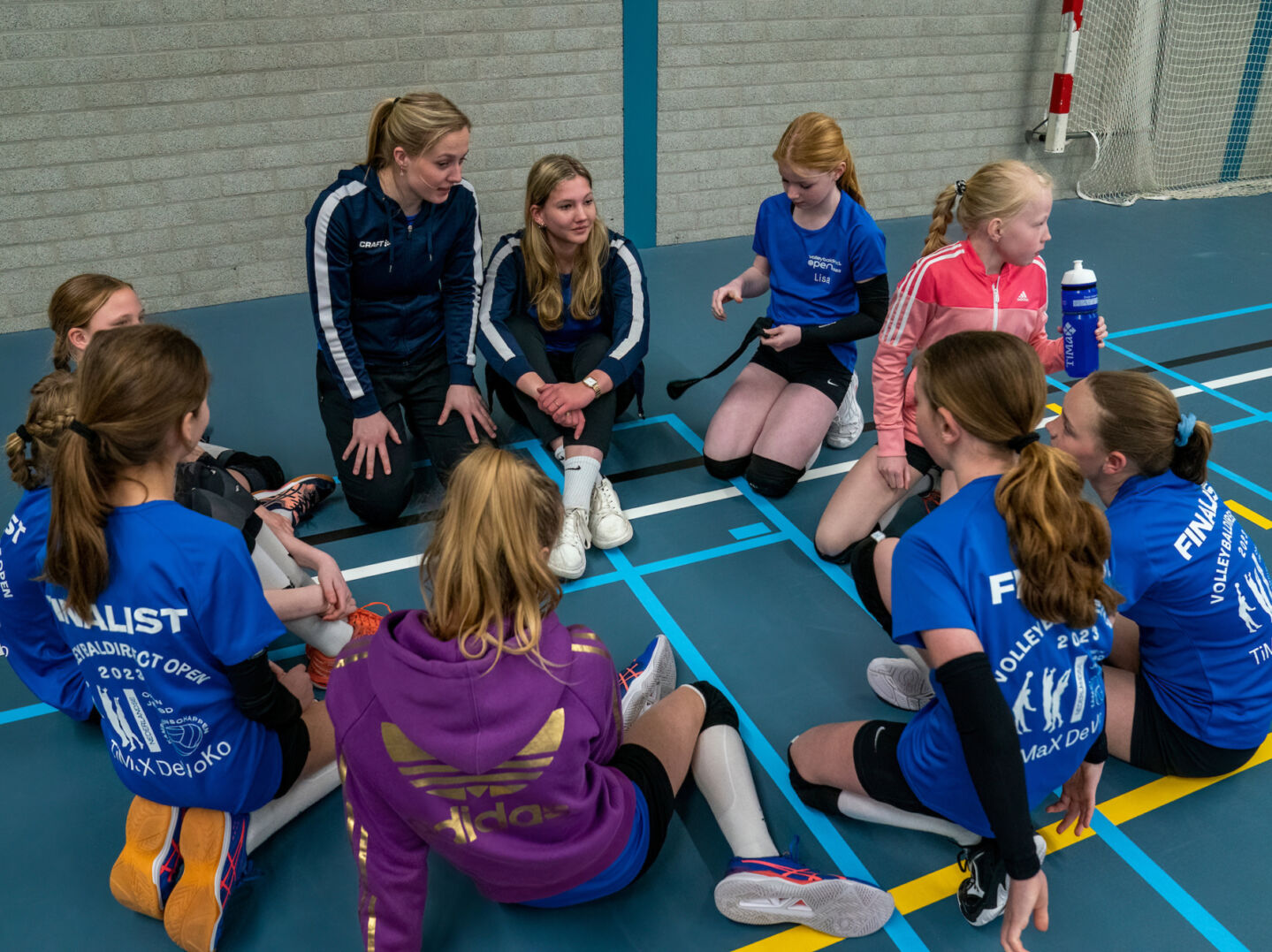
We Lead Volleyball Together
Using volleyball to enhance leadership among (female) young adults
Despite volleyball's popularity among girls in Europe, a noticeable gap exists in leadership roles, with women less represented as trainers, coaches, board members and referees. To address these goals, we started the We Lead Volleyball Together (WLVT) project, which is made possible with the support of the Erasmus+ Programme of the European Union. The project started in January 2024 and will last until June 2026.
Background
After research, we have pinpointed four critical gaps that need to be addressed in order to develop more future female leaders in volleyball:
- Glass ceiling: Females face significant barriers in advancing to leadership positions within the volleyball community.
- Gender and age imbalance: there's an imbalance among sports volunteers, not only among male and female volunteers, but also among individuals under 25 and their older counterparts.
- Education and knowledgeg gap: there is a lack of good education programs for youth to develop skills through sport.
- Sports offerings mismatch: a discrepancy exists between the preferences of youth and the offerings provided by clubs/federations, leading to a lack of engagement and participation.
Objectives
The project sets four objectives to tackle, each designed to make meaningful changes in the world of volleyball, filling the gaps described above. These goals are:
- To stimulate female leadership and increase the autonomy and leadership skills of youth between the age of 16-20 years (especially girls);
- To implement, test and adjust the volleyball young leaders' program in four EU countries and at the same time organize volleyball activities that match the needs of teenagers;
- To create more awareness and interest within volleyball clubs and federations about the relevance of gender-balanced youth participation in decision-making;
- To stimulate and create more knowledge transfer about youth involvement and giving youth responsibilities in volleyball.
Activities
To fill in the gaps and achieve the established objectives, the following activities will be conducted during the project:
- A leadership training program will be designed and delivered to young adults which will provide mentorship opportunities, create networks and prioritize diversity and equity in leadership positions;
- The 4 national federations will select and train 8 Facilitators;
- The National Facilitators will train 37 Club Mentors among 27 volleyball clubs;
- The Club Mentors will select and train 141 Young Leaders aged 16-20 (at least 60% women);
- An international Young Leaders community will be established that will nurture leadership skills in the future.
- There will be 34 events in clubs, schools, or community settings, organized by the Young Leaders with 1.600 participating youngsters aged 13-15.
- 14 educated Role Models, primarily female, will be involved.
Partners/Beneficiaries
- The Norwegian Volleyball Federation (NVFB) manages national teams, competitions, the development of various volleyball forms and supports over 22,000 members. It emphasizes growth from grassroots to elite levels, with dedicated departments providing expertise and resources to 313 clubs. NVBF's commitment to volleyball as a tool for social and personal development aligns with the project's goal of fostering leadership skills, especially in young women, to enhance diversity in decision-making roles.
- The Danish Volleyball Federation (VODE) represents 247 clubs with over 16,000 members. It is committed to developing and promoting volleyball nationally and internationally. A central focus of their strategy is the development of volunteers and young leaders within their clubs. With a rich history of collaboration on youth leadership initiatives, they bring valuable experience and a network of clubs to the project, facilitating the testing and implementation of innovative leadership concepts in Danish volleyball.
- The Icelandic Volleyball Federation (BLI) oversees national teams, competitions, youth activities and education outreach in Iceland. Based in Reykjavík, they support 29 clubs and over 3,500 participants. BLI, committed to developing competitive international standards in players, coaches, and officials, aligns with the project's objectives. Their current focus on revamping coach and gym instructor education aligns with fostering youth leadership, particularly for girls and boys aged 16-19.
- The Hague University of Applied Sciences (THUAS) offers a diverse range of programs, including International Sport Management (ISPM). Located in The Hague, the university strongly focuses on making the world better through sport, with special emphasis on sustainability, diversity, and inclusion. Recognized for its international reach, THUAS plays a crucial role in addressing the underrepresentation of women in sports leadership, offering courses that develop leadership skills and encouraging female participation in sports management.
Advisory Board
The project is supported by an Advisory Board, which plays a crucial role in offering insights, skills, and feedback on project outcomes. This board features a group of international sports experts, including prominent figures from the Netherlands: Marijke Fleuren, the former President of the European Hockey Federation and now President of the Advisory Board, and Madelein Meppelink, an esteemed former beach volleyball Olympian and European Champion.
Additionally, the board includes Hanne Sogn from Norway, the General Secretary of the Norwegian Basketball Federation with a strong commitment to female empowerment, and Martin Collins from Denmark, the innovative national coach for Denmark's youth and senior volleyball teams. Their collective expertise and experiences in sports and leadership significantly enhance the project's direction and impact.
Contact
Do you want to know more about the project? Please feel free to contact Dorien Tenhaeff via dorien.tenhaeff@nevobo.nl or 030-3077733.










